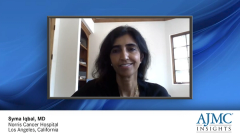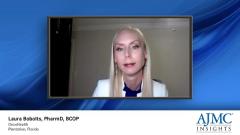
Overview of CheckMate Trials 648 and 649
CheckMate trials 648 and 649 explored various chemotherapy strategies for ESCC and GI cancer treatment.
Episodes in this series

Syma Iqbal, MD: CheckMate 649 was a randomized trial for patients with untreated esophageal GEJ [gastroesophageal junction] and gastric cancer. These patients were randomized to 5-FU [5-fluorouracil]–platinum–based therapy plus nivolumab vs nivolumab with ipilimumab. The nivolumab-ipilimumab arm didn’t demonstrate significant activity, so we’ll focus on chemotherapy vs chemotherapy plus nivolumab. The dual primary end points of this study were overall survival and progression-free survival in patients who had a PD-L1 CPS [combined positive score] of 5 or greater. This trial met its primary end points and demonstrated superiority in both progression-free survival and overall survival. Progression-free survival was increased to about 7½ months, and overall survival approached 14 months.
The primary end point was for patients who had a PD-L1 CPS of 5 or greater. But in an evaluation of all comers–those who didn’t meet that criteria—it appeared that the overall population also benefited from the addition of nivolumab. Then the subgroups of patients who had a PD-L1 CPS of 5 or greater seemed to demonstrate increased activity with the addition of the nivolumab. In terms of toxicity, this was well tolerated. There were no new safety events noted. Based on CheckMate 649, nivolumab is incorporated into the first-line treatment of patients, generally with FOLFOX [5-fluorouracil, leucovorin, oxaliplatin], which was used in this study for esophageal adenocarcinoma, GE [gastroesophageal] junction adenocarcinoma, and gastric adenocarcinoma.
The CheckMate 648 study was done for patients with esophageal squamous cell carcinoma. This was a randomized trial for untreated patients who received chemotherapy, 5-FU–platinum vs nivolumab with ipilimumab vs chemotherapy plus nivolumab. What was interesting about this study is that nivolumab plus chemotherapy demonstrated superiority over chemotherapy alone, but nivolumab plus ipilimumab also demonstrated an improved outcome when compared with chemotherapy alone. These patients clearly benefited from the addition of immunotherapy.
In this population, this study’s primary end point looked at patients with a CPS of 1 or greater. The FDA approved nivolumab plus chemotherapy as well as nivolumab and ipilimumab as frontline treatment options for patients with esophageal squamous cell carcinoma. This is the first approval we have for nonchemotherapy-based frontline treatment for esophageal squamous cell carcinoma.
In terms of determining whether patients should get chemotherapy plus immunotherapy vs immunotherapy alone, what’s bearing out is that if we need a significant response, the chemotherapy plus immunotherapy had higher response rates. It may be those patients who perhaps have low disease burden, or consideration for patients who have a higher disease burden to start with chemotherapy plus immunotherapy and then drop the chemotherapy and continue with the combination immunotherapy. That’s still being borne out in terms of which patients would benefit from the chemotherapy plus I/O [immuno-oncology] vs the dual I/O.
At this point, both are approved treatment options for patients with esophageal squamous cell carcinoma. In terms of toxicity, both regimens were well tolerated. There were no new, unexpected adverse events reported, so it has increased our choices for these patient populations.
Transcript edited for clarity.
Newsletter
Stay ahead of policy, cost, and value—subscribe to AJMC for expert insights at the intersection of clinical care and health economics.












